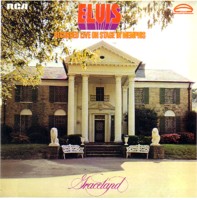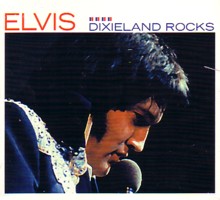Elvis:
Sightings and Faith: Making Sense of the Seemingly Absurd
by
Nigel Patterson
Presented
at the National Elvis Presley Convention, Canberra, Australia,
28 November 2004
(another
article in EIN's series of trying to undertand the question..."Why
Elvis?")
| Rev.
Dorian Baxter 'Christ the King, Graceland Independent
Anglican Church of Canada' (another photo of Rev.
Baxter appears below) |
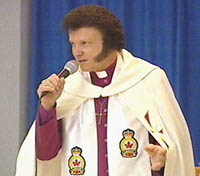 |
Abstract:
There is a growing body of formal research and evidential
observation that suggests fan worship around Elvis Aaron Presley
is often of a "religious" nature involving iconic elements
representative of all "faith" groups. This paper provides
a construct around the concept of Elvis faith ("Elvism). It
looks at the two different types of "Elvis sightings" and
how they relate to the concept of an Elvis faith, and discusses
primary environmental conditions underpinning and driving
the growth of that faith.
Opening
quotation:
Lisa
Marie Presley on Larry King Live, was asked by the host what
Elvis had that others didn't. She answered: '…his spirit',
'his soul' comes through in his singing.
Introduction
Today
I want to take you into the minds of many Elvis fans. And
I mean that somewhat literally, for if one seriously considers
the material I am about to present, the explanatory answers
that my discourse necessarily requires, lie inside each and
every one of the fans who make up what is a growing number
of people who see Elvis Aaron Presley as much more than just
a great entertainer.
By
the end of my address I hope you will appreciate that there
two distinct types of Elvis sightings and that there is a
direct link between both types of Elvis sightings and what
many commentators have called, "Elvis Faith".
I
must stress at the outset that the paradigm for my address
does not include the separate but related theme that Elvis
did not die on August 16, 1977 and is in fact still alive.
So if there are any "Elvis is alive" believers here today,
you will probably be disappointed by my paper. Please also
note that due to time limitations, it is not my intention
to discuss the relative merits of:
(i)
Elvis faith as 'religion', 'sect' or 'cult';
(ii)
the relative numbers of "Elvis disciples" versus simply "Elvis
fans"; nor
(iii)
how "Elvis faith" is marketed within and inculcated throughout
the Elvis community.
These
issues are all papers in themselves.
My
paper will however refer to "Elvism" (as coined by John Strausbaugh
as religion but I note that other commentators, notably Ted
Harrison, view it more as a "growing cult". The semantic distinction
between "religion", "cult" and "sect" is irrelevant to this
paper as it my objective to outline those "essential characteristics"
that place Elvis worship within the construct of religious
pluralistic study.
If
you were mention in casual conversation that Elvis Presley
represented some type of religion what do you think people's
reaction would be? It is likely you would meet with either
sceptical disbelief (the "Don't be absurd!" view) or sceptical
amusement (the "You're not really serious" view). Yet, this
is a very serious subject and as we'll touch on, the debate
mirrors similar debates throughout religious history.
The
debate is particularly interesting in the context of continually
falling attendances within the institutional church environment
and the growing number of smaller, "boutique" faith or religious
groups.
Elvis
sightings
Most people think that the sightings of Elvis began near Kalamazoo
around 1988. (1) This is actually not
the case. Sightings of "The King" started virtually the day
he died. (2)
The
sightings however only came to public consciousness after
the Vicksburg, Michigan (which is located near Kalamazoo)
sighting by Louise Welling (3) an incident
that was picked up by the tabloid press and initiated many
years of follow up stories/sightings.
As
a matter of some unrelated interest, for any Elvis historians
in the audience, the phenomenon of Elvis sightings extinguished
the media's earlier ongoing interest in Elvis' illegitimate
children, of which more than 12 came forward. An interesting
element of Elvis sightings is that there are in fact two distinct
types of sightings and they serve much different functions.
Both
are arguably grounded in a form of "death denial" and are
categorised as:
'Live Elvis' sightings; and
'Spirit
Elvis' sightings.
"Live
Elvis" Sightings
It
is the former type or "Live Elvis" sighting that the media
and public tend to focus on. John Strausbaugh in his insightful
book, E Reflections on the Birth of the Elvis Faith
notes that the function of 'Live Elvis' (4)
sightings is simply to "perpetuate the lore that Elvis is
alive and well."
Sightings
in this category are typically fleeting and poorly photographed
and as such Strausbaugh draws a reasonable parallel with sightings
and photos of Bigfoot and UFO's. While Elvis sightings are
now not as prolific as they were throughout the 1990s, when
he is seen it is at places and in situations many find incredulous,
at county fairs, in cafes or restaurants, at the local supermarket,
buying petrol etc.
His
presence being seen in such prosaic situations and places
should not be surprising though. Where else would people
see him but in settings where they live their lives?
And
as Strausbaugh theorises in his book, "these familiar settings
serve a purpose: their banality lends acceptability and plausibility
to the sightings." The sightings are consistent with the findings
of a number of anthropologists, everyday settings frequently
occur in stories of the supernatural and unusual.
Strausbaugh
comments: "A completely ordinary setting not only makes an
incredible tale seem a bit more credible, it also grounds
an extraordinary event in familiar reality." There are obviously
psychological forces present in 'Live Elvis' sightings. While
they/we didn't realise it at the time, Elvis Presley in the
1950s and 1960s was incredibly important to youth. His importance
went far beyond just his music...his was a major cultural
influence.
Leonard
Bernstein (5) astutely stated:
'Elvis
Presley is the greatest cultural force in the 20th century.
He introduced the beat to everything and changed everything
- music, language, clothes - it's a whole new social evolution.
Because of him, a man like me barely knows his musical grammar
anymore'.
Elvis
indeed opened the door to a bourgeoning youth culture, his
impact changed the way teenagers talked, the way they dressed,
the way they wore their hair. Elvis paved the way for the
sexual revolution of the 1960s.
And
when he died, the seminal psychological impact he had made
on millions of fans had to manifest itself.
Strausbaugh
comments: "The day Elvis died people were already insisting
they would never let his memory die. Instinctively they knew
in that instant that they had to preserve his memory and pass
it on to future generations."
This
is a powerful, if not fully acceptable, explanation of the
world's ongoing interest in The King of Rock & Roll. It neatly,
some might say conveniently, explains why he is routinely
seen at corner drug stores or service stations, why the number
of Elvis fan clubs (although not necessarily the number of
Elvis fans) continues to climb 27 years after his death, why
his 2002 album, "Elvis 30 #1 Hits" has sold more than 10 million
copies worldwide, and why around 100 Elvis active Internet
sites exist.
We
cannot let him go, nor can we let go of him!
Psychological
Needs of Fans - The UFO Connection
|
On
another level, Strausbaugh comments that: "Throughout
history people have believed that their deceased hero
figures will someday return to them as messiahs" (6).
Does this offer a clearer insight into not only the
growing phenomenon of the Elvist faith, but also its
future direction?
In
considering a psychological needs theory, it is interesting
(and instructive) to note a similar hypothesis originally
put forward to explain the function of UFO's in modern
society. That theory, proposed by Dr. Jacques Vallee,
suggests that UFOs function to 'stabilize the relationship
between our consciousness needs and the evolving complexities
of the world we must understand' (7).
|
 |
Could
Elvis Aaron Presley function in a similar way? I
will return to this theme later in my address.
Universality
of Sighting "Motifs"
One
of the most interesting narratives in Strausbaugh's book is
his commentary on the similarity between (or borrowing of)
motifs in Elvis sightings to those present in the conspiracy
theories surrounding the assassination of JFK and the deaths
of Marilyn Monroe and Jim Morrison.
Involvement
of the CIA, a hoaxed death, possible murder, post-death sightings
etc are all constants in these other deaths and the lore that
has subsequently built up around them.
In
this respect, only last month a semi-fictional new Elvis book
was published: "The Tupelo-Memphis Murders: A Study of Self-Destruction
and Murder!" (8) Using known facts from
Elvis' life, borrowing conspiracy theories rampant on the
quite sinister, but little known, "Elvis underground", and
injecting sensational speculation, the book has split the
Elvis world in two.
Many
mainstream fans are dismayed by its conspiratorial nature,
murder theme and incest content, while "hardcore", underground
fans are actively promoting its polemic messages. But this
is another story.
Spirit
Elvis Sightings
I
now want to turn to the second type of Elvis sighting, known
as Spirit Elvis Sightings. 'Spirit Elvis' (9)
sightings function very differently to "Live Elvis" sightings.
These experiences "elevate Elvis to a figure of myth and miracle,
and tales of such sightings generally conform to the framework
of folklore."
|
The
stories involve elements of magic, moral instruction
and help, themes characteristic in the development and
maintenance of other "faith" groups. In 1987, Dr Raymond
A. Moody, M.D. published a remarkable book, Elvis
After Life: Unusual Psychic Experiences Surrounding
the Death of a Superstar (10).
In
it he recounted the findings of his research into spiritual
Elvis sightings. The stories were to say the least incredible,
but each of the people experiencing them fervently believed
their experience was real.
|
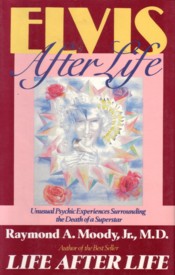 |
In
fact, many are hard to dismiss, like the Georgia cop whose
estranged son had gone missing. Elvis came to the father in
a dream and told him to go to a place in Los Angeles where
he would find his son. The father travelled to the place,
and yes, father and son were reunited!
Similarly,
what do we make of the case of a self-centered yuppie, fresh
out of a horrendous divorce, who goes hiking alone on the
Appalachian Trail to 'find himself'. During his adventure
he meets a stranger by the name of Jo(h)n Burrows. Under the
cover of a starry night Burrows tells the man of his philosophy,
a mixture of Christianity and Buddhism, tough love and New
Age mysticism.
With
the stranger's help the man slowly re-evaluates his wasted
life and gains a greater understanding of God. When the man
awakes in the morning, Jo(h)n Burrows (the mythical 'stranger
ghost') has vanished. Some time later, the man sees a television
program about Elvis and discovers that one of Elvis's aliases
was...Jo(h)n Burrows.
Other
examples of Spirit Elvis sightings or experiences are the
well-documented 'poltergeist' type tales of Elvis records
mysteriously melting on August 16, 1977 and Elvis figurines
jumping off mantelpieces and shattering into a thousand pieces.
A
further variant is the 'it's a miracle' incidents where someone
is saved from death or great pain. The notion of "miracles"
is of course a staple theme in religious studies. There are
several documented accounts of children in a comatose state
and thought beyond the reach of medical science who miraculously
recover when an Elvis song comes on in their room.
In
2002, the Elvis Information Network, of which I am
President, published a review of the book, Elvis Was My
Speech Therapist by James Lee Bradley (11).
The Bradley story is not dissimilar to the events we are describing
here. As an 18 year-old, James Bradley was involved in a horrific
car accident that left him unable to speak or walk. Doctors
said he would never recover yet through a combination of attitude,
determination and Elvis music playing continuously in his
room, James made a full recovery, a recovery his doctors called
a miracle!
And
in 'Elvis After Life', Dr Moody includes the moving story
of a 10-year-old girl suffering from Down's syndrome who just
before dieing, beamed a big smile and said: "Here comes Elvis......Here
comes Elvis."
An
essential characteristic of stories such as these is that
they are 'vague' and 'beyond empirical proof'. As Strausbaugh
states: "They are a matter of faith." In this context, it
is not difficult to understand how many consider the ongoing
fascination, devotion to and experience of Elvis as equivalent
to a faith or religion.
Elvis
as Religion
Since
Elvis's death in 1977 several organised churches or religions
around his memory have been formed including:
- The
First Presleyterian Church of Elvis the Divine (now active
on at least two continents), (12)
- The
First Church of Jesus Christ, Elvis, (13)
- Elvis
Gospel Ministries, (14)
- Christ
the King, Graceland Independent Anglican Church of Canada,
(15) and
- The
24 Hour Church of Elvis. (16)
I
must note that not all of these are of a serious nature, principally
the parody web site, "The First Church of Jesus Christ, Elvis".
In
addition, at least six academic books have been published
in the past decade examining the Elvis phenomenon as religion
and the motivations of its followers ('Elvites').
As
Strausbaugh notes, "Elvis left such a precise schematic for
the Elvii and the faithful...". Structural Elements of "Elvism"
Consider some of the structural, iconic 'religious' elements
present in Elvism:
- the
High Priest/God (Elvis)
- ceremonial
and symbolic garb/vestments (jumpsuits) worn by the Disciples/Minister's
(impersonators);
- religious
relics (memorabilia; records);
- annual
pilgrimage to the places of worship (Graceland, Tupelo,
shrines and fan club arranged memorial sites); and
- rituals
(Giving of the Scarves; playing of particular Elvis songs;
facing Graceland; the Candleight Vigil; culinary protocols).
(17)
|
We
should also consider what Sue Bridwell Beckham wrote
in her study of Elvis shrines and souvenirs:
"If
the ambivalent purpose of the meditation gardens suggests
that Elvis Presley is afforded near-divinity, the Christmas
cards sold at Graceland offer even more. Any who doubt
that Elvis followers make some kind of confused association
between Elvis and the founder of the Christian religion
need only contemplate the reasons for making Christmas
greetings cards out of the images of an Elvis shrine."
(18)
|
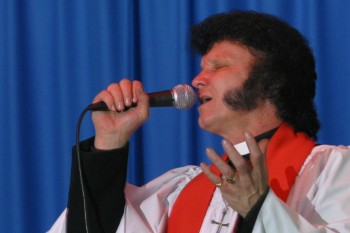 |
Elvis
Faith Lives in Australia!
Even
Australia has its own Elvis church. The First Presleyterian
Church Australia was founded in 1998, a chapter of the First
Presleyterian Church of Elvis the Divine.
A
short digress. So far in my address I've been somewhat vague
about the relationship between 'Elvis sightings' and 'Elvis
faith'. This has been intentional but now is the time to make
that link more visible, using two examples.
Underpinning
the doctrines and philosophy of Elvis religions are several
fundamental beliefs.
Consider
this statement:
"Elvis
was always my protector…I knew he would come back to be with
me".
This
comment was made by a fan attending a seminar on Elvis sightings
held in Nevada. She received a standing ovation from the audience
of nearly 100.
Consider
another statement:
"Elvis
sightings are proof of the King's divinity." This statement
was made by one of the founders of The First Presleyterian
Church of Elvis the Divine, Dr. Edwards. (19)
Dr.
Edwards went on to say: "The resurrection of Elvis is the
fundamental belief of Presleyterian faith". (20)
I
hope you can now more clearly see the link between Elvis sightings
and Elvis faith.
The
worrying thing (it worries me anyway) is that the founders
of The First Presleyterian Church of Elvis the Divine apparently
spent five years developing church doctrine and sacred rituals
before going public with their new religion.
Unfortunately,
much of their doctrines and rituals are what I'll term classic
"humor fodder for the mass media" - they serve only to attract
ridicule, scorn, or at best, offer good natured amusement.
Followers
of the religion are required to:
- face
Las Vegas daily (as opposed to the practice adopted by other
Elvis religions of "facing Graceland")
- make
a pilgrimage to Graceland at least once during their lives
- overindulge
in worldly pleasures
- have
their children praise Elvis daily
- follow
strict dietary laws - the 31 "Holy Items" Elvis stocked
in his kitchen pantry at all times (21)
You
are probably listening to this thinking I'm either taking
the mickey, or The First Presleyterian Church of Elvis the
Divine is just a bit of fun by some extreme Elvis fans.
Well,
extreme they might be, but engage in correspondence with Minister
Anna and you'll soon discover this is no laughing matter.
We (not only) live in interesting times, to quote the Chinese
proverb, but we also live in a strange world!
Some
religious history. While it is easy to dismiss the Elvis as
religion, sect or cult concept, it is mindful to note that
many other faiths and religions arose from 'pagan' origins
and were also derided in their formative period. Christianity
was once regarded as a "cult menace" while the Mormans endured
much before emerging as a powerful religious movement. (22)
And
at any one time in history there have always been numerous
'grass roots' movements operating outside mainstream religion.
For instance, the Roman Catholic Church today continues to
have to deal with its own long running, grass-roots bugbear,
the 'Cult of the Virgin' (Mary). (23)
In
any case, as Strausbaugh and Enders have both stated, "popular
religion is a lot more about feeling than thinking anyway".
(24)
But
does "Elvism" fit within contemporary religious theory?
"Religious
pluralis" (or "religious pluralism)" (25)
is a common term used to describe two things:
(i)
the growth and diversity of new religious movements; and
(ii)
that differences between different religions can be overcome
by respecting "core principles" rather than "marginal issues".
It
is my contention that in this environment, "faith groups"
based around "Elvis Presley" sit comfortably within discussions
about religious theory and can be analytically considered.
But
why Elvis?
Earlier
I touched upon Elvis' incredible cultural influence as perceptively
encapsulated by the great Leonard Bernstein and skillfully
reinforced by John Strausbaugh's observation that the day
he died "people were already insisting they would never let
his memory die".
Let
me add additional arguments to the theory that help explain
why "Elvism" has developed and continues to develop as a modern
day religion.
Rapid
technological and social change has contributed to the increasingly
impersonal and unsatisfying nature of many people's daily
lives, and increasing anxieties about meaning, roots and the
future.
Corresponding
to these forces there has been a weakening of traditional
faith and its structures, a weakening of belonging to the
faith community, and in order to resolve resultant tensions,
an attempt by many people to harmonize their faith environment
by inserting into their own creed, elements that clash with
the Christian message. (26)
On
this level it is not hard to understand how many Elvis fans
are successfully integrating their basic Christian beliefs
with their "worship" of a man who continues to bring them
immense internal joy and equilibrium. As Enders and Patterson
noted in "Elvis as Religion: key psychological drivers and
marketing of the Elvis Faith": "In our contemporary world,
harmony comes by remaining true to the basic tenets of Christianity
while at the same time internally embracing other, psychologically
reassuring drivers". (27)
So
far I have concentrated on theoretical arguments about "Elvism",
arguments general in nature and removed from the "personality"
of actual people.
So
what of the human aspect? What do fans who exhibit characteristic
elements of religious faith think and feel about what they're
doing? Let's look at several specific case studies.
Some
fans, like Elizabeth Bedsall from Liverpool in England, are
very clear that their worship is just that, religious worship.
Mrs Bedsall was interviewed for a TV documentary and commented:
"Elvis brings me internal peace. When times are hard I only
have to put an Elvis record on and my energy is recharged
and I know there will be light at the end of the tunnel. (28)
Similarly,
Ruth Jones from Ohio in the US said: "My husband didn't understand
my devotion to Elvis, at least initially during our marriage.
Slowly he came to understand how good Elvis made me feel inside
and now he shares my devotion. Each Sunday we pay tribute
to Elvis as we do to God at our local church. (29)
The
theme of Elvis bringing his fans "internal peace" has been
recorded countless times. Even Paul McCartney once said that
if he was ever down all he had to do was put on an Elvis record
and it would lift his spirits. (30)
I could offer further examples but I think the three cited
sufficiently demonstrate the point about the feelings experienced
by "Elvites".
Other
fans, who I will call "non-Elvites", however see their admiration
of Elvis as simply that, admiration, and appreciation of a
fine talent. They do not consciously make the behavioural
connection between "how" they admire their hero and its similarities
to how members of accepted religious groups "worship" their
gods. (31)
Quotation
Before
closing I need to mention another quotation and make some
observations about it. "Down South, there's a saying that
in every poor black home there are two pictures on the wall
- Jesus and Martin Luther King, Jr. Poor white homes also
have two: Jesus and Elvis." (32)
Observation
Setting
aside the element of "wealth", or lack thereof, implicit in
this observation, it serves as a potent statement of what
is happening on a broader than imagined scale in homes not
only in the US but in many countries around the world.
| The
statement is accentuated when we also consider the concept
of "Elvis shrines", a widespread phenomenon that has been
well reported by the media. Both the notion of an Elvis
picture hanging on the wall and of countless Elvis shrines
in homes around the world are highly potent symbols of
key psychological drivers that produce a "religious" reality
for many, many Elvis fans, even if some don't consciously
realise the outcome. |
 |
Add
to these notions others like:
- "informal"
membership of the Elvis community (just being a fan and
listening to Elvis' music);
- "formal"
membership of the Elvis community (joining a fan club);
and
- the
"pilgrimage" thousands of devoted fans from around the world
make to Graceland during "Elvis Week" each August; and the
"religious reality" becomes much stronger, internally and
externally. (33)
A
similar dynamic, structural design and patterns of behaviour
are observed in mainstream religion. Increasingly, affiliation
with the church is weakening with congregation numbers falling,
and direct participation with one's faith changing from a
daily mandatory observance to a non-mandatory ad-hoc one.
No longer does religious affiliation dominate life for most
religious followers. While individuals may retain a religious
affinity, its importance in each person's life now varies,
unlike historically when it assumed high importance broadly
across the community. (34)
Closing
remarks
I
leave the penultimate words to John Stausbaugh: "Who knows
what will become of the Elvis faith? ...it is a religion based
on love of Elvis Presley and rock 'n' roll. Outsiders don't
fear it, they just laugh at it. The fact that outsiders can't
take it seriously may turn out to be its strength and its
shield. Maybe by the time Elvism is taken seriously it will
have quietly grown too large and well established to be crushed
like the Branch Davidians." (35)
In
contrast to Strausbaugh, and borrowing from Enders and Patterson,
another possible question centres around negative forces in
"Elvism"….restrictive forces that may prevent it from moving
beyond what currently is essentially small gatherings of members,
or individual worship, to a broader movement with potential
to become a recognised "institution" in the religious community
with broad based appeal................
..................(Or)
will "Elvisoid like" (36), 'mirror Elvis'
ego-centrism and the self-defeating nature of many fans see
"the structurally fragmented existence of their worship continually
relegate their set of beliefs to the marginal fringes of contemporary
society and prevent greater numbers of Elvites joining organised
church services based around The King's being?" (37)
Only
time will tell.
Sources:
(1)
Enders, Dr. Gary & Patterson, Nigel, Elvis as Religion: key
psychological drivers and marketing of the Elvis Faith, unpublished
draft paper, 2003
(2)
Denisoff, R. Serge & Plasketes, George, True Disbelievers
The Elvis Contagion, Transaction Publishers, USA, 1995, ISBN:
1560001860, p. 4
(3)
Denisoff, R. Serge & Plasketes, George, op. cit., p.4
(4)
Strausbaugh, John, John. E Reflections on the Birth of the
Elvis Faith, Blast Books, USA, 1995, ISBN: 0922233152, p.
126
(5)
Strausbaugh, John, ibid, p. 117
(6)
Bernstein, Leonard, in Artist of the Century (liner notes),
BMG, 1999, 07863677322
(7)
Vallee, Dr. Jacques, The Invisible College, E.P. Dutton &
Co., USA, 1975, ASIN: 0525134700
(8)
No author, The Tupelo-Memphis Murders: A Psychological Study
of Self-Destruction and Murder!, Unquiet Grave Productions,
2004
(9)
Strausbaugh, John, op. cit, p. 132
(10)
Moody, Dr. Raymond A., Elvis After Life: Unusual Psychic Experiences
Surrounding the Death of a Superstar, Peachtree Publishers,
Ltd., USA, 1987, ISBN: 0934601402
(11)
Bradley, James Lee, Elvis Was My Speech Therapist, Trafford,
Canada, 2002, ISBN: 1553950461
(12)
The First Presleyterian Church of Elvis, http://www.geocities.com/presleyterian_church/
(13)
The First Church of Jesus, Elvis, http://jubal.westnet.com/hyperdiscordia/sacred_heart_elvis.html
(14)
Elvis Gospel Ministries, http://netministries.org/see/charmin/CM00784
(15)
First anniversary for 'Elvis Priestly' church, CBS News Online,
11 January 2004
(16)
The 24 Hour Church of Elvis, http://www.frankwu.com/elvis1.html
(17)
Enders, Dr. Gary & Patterson, Nigel, op. cit. Strausbaugh,
John, op. cit.
(18)
Beckham, Sue Bridwell, quoted in Elvis People The Cult of
the King, Harrison, Ted, HarperCoillinsReligious, 1992, ISBN:
0-00-627620-2, p. 96
(19)
The First Presleyterian Church of Elvis the Divine, www.geocities.com/presleyterian_church/history.html
(20)
ibid
(21)
ibid, www.geocities.com/presleyterian_church/charter.html
(22)
Warner, Marina, Alone of All Her Sex: Myth and Cult of Virgin
Mary, Random House Trade Paperbacks, USA, 1983, ISBN: 0394711556
(23)
Strausbaugh, John, op. cit., p. 37
(24)
(edited by the) Working Group on New Religious Movements in
the Vatican, Spiritual and Theological Discernment regarding
the New Religious Movements, An Anthology of Texts of the
Catholic Church 1986-1994,
(25)
Samples, Kenneth Richard, Responding to Religious Pluralis,
Augustine Fellowship Study Center/Facts and Faith, First Quarter
1998
(26)
Working Group on New Religious Movements in the Vatican, op.
cit.
(27)
Enders, Dr. Gary & Patterson, Nigel, op. cit.
(28)
ibid.
(29)
ibid.
(30)
ibid.
(31)
ibid.
(32)
Strausbaugh, John, op. cit., p. 220
(33)
Enders, Dr. Gary & Patterson, Nigel, op. cit.
(34)
Enders, Dr. Gary, Elvis: Coming Back from the Dark Age, in
Culture & Politics, 2000
(35)
Strausbaugh, op. cit., p. 19
(36)
Patterson, Nigel, "Almost Elvis"…..The Unusual and Bewildering
World of Elvis Impersonators!, Elvis Information Network,
2002 (http://www.elvisinfonet.com/impersonators.html)
(37)
Enders, Dr. Gary & Patterson, Nigel, op. cit.
This
is the second edition of this paper. A shorter paper was published
as part of The First Online Symposium on Elvis Aron Presley
in 2003.
The
Symposium papers can be found at: www.geocities.com/elvissymposium
Click
to read Elvis: The Following
©
2004
|



